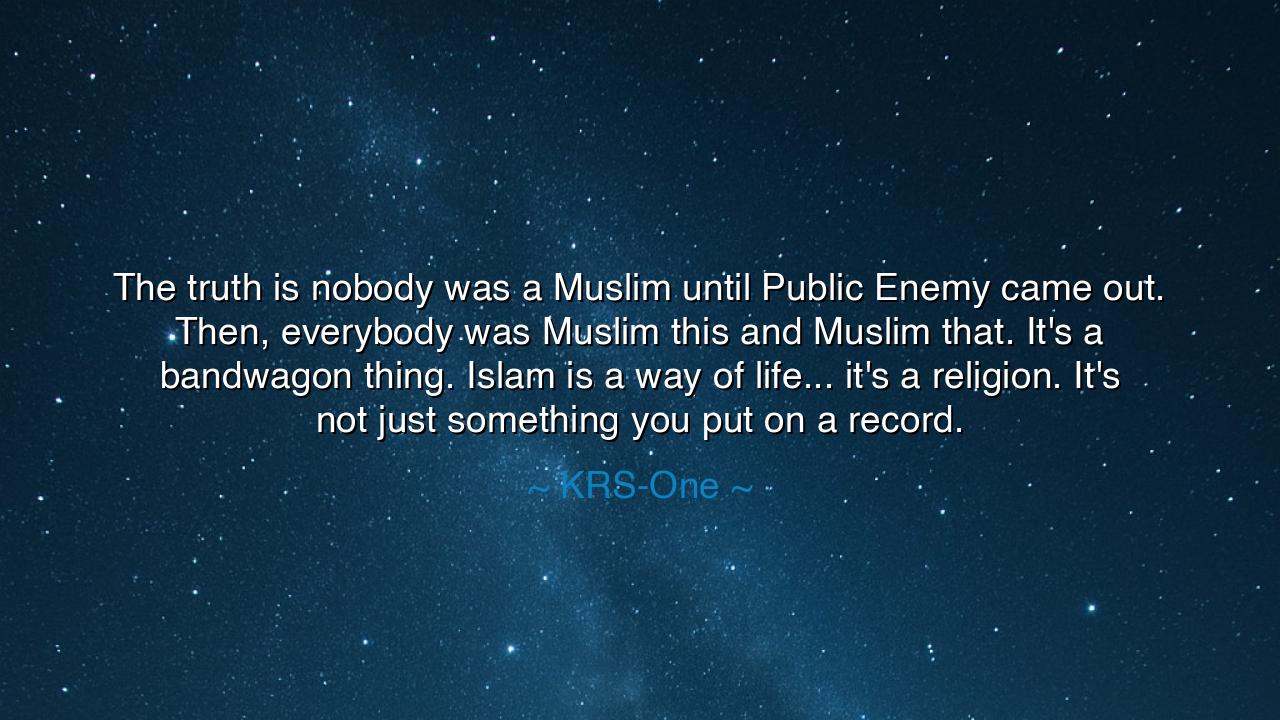
The truth is nobody was a Muslim until Public Enemy came out.
The truth is nobody was a Muslim until Public Enemy came out. Then, everybody was Muslim this and Muslim that. It's a bandwagon thing. Islam is a way of life... it's a religion. It's not just something you put on a record.






"The truth is nobody was a Muslim until Public Enemy came out. Then, everybody was Muslim this and Muslim that. It's a bandwagon thing. Islam is a way of life... it's a religion. It's not just something you put on a record." These words from KRS-One strike at a deeper truth about the nature of identity, culture, and authenticity. What the great philosopher and educator speaks to here is the tendency in society to adopt labels or affiliations without truly understanding or living by the principles behind them. Islam, as KRS-One asserts, is not a trend or a fad to be worn like a fashionable accessory; it is a profound way of life, a comprehensive belief system that governs one’s actions, thoughts, and heart.
This statement, though directed toward a specific cultural context, resonates with ancient wisdom that has long understood the danger of superficiality in the pursuit of meaning. The ancients believed that a true way of life, a true path, could not be reduced to a mere outward appearance. Socrates himself emphasized the importance of the inner life, and how one’s actions should align with their deepest convictions. A life lived for outward display, he said, would lead to internal turmoil and disillusionment. The same truth KRS-One alludes to is echoed in Socrates' counsel — that true identity, true connection to anything sacred, cannot be merely adopted for appearance's sake.
Public Enemy, the revolutionary hip-hop group, played a significant role in elevating Islamic identity within popular culture, especially through their music, which was deeply influenced by the teachings of the Nation of Islam and the larger African-American Islamic movement. Yet, as KRS-One points out, this popularization did not necessarily translate into true understanding or commitment. Just as Public Enemy raised awareness, many individuals adopted the outward symbols of Islam without internalizing its values, its teachings, or its discipline. This is a powerful reflection on how movements and trends can sometimes eclipse the deeper, more meaningful foundations they spring from.
The ancient world also witnessed similar phenomena, where the adoption of a belief system or a cultural identity was often superficial and driven by external forces. Consider the rise of Hellenistic culture under the conquests of Alexander the Great. As Greek influence spread across the Mediterranean and beyond, many regions adopted the Greek way of life — not always out of true understanding, but as a way to align with the prevailing power. Stoicism, a powerful school of philosophy that taught living in harmony with nature and virtue, became widely practiced by many who, despite claiming its tenets, often misapplied them for personal or political gain. Just as KRS-One critiques the bandwagoning trend, the Greeks warned that superficial adoption of culture or philosophy could easily lead to the corruption of the very essence that made those beliefs valuable.
A real-life example of this principle can be seen in the early days of the Civil Rights Movement in the United States. Leaders like Malcolm X and Muhammad Ali adopted Islam not as a passing trend, but as a transformative force that shaped their identities and actions. They understood that Islam was not a label, but a call to a higher standard of living — one that encompassed everything from personal morality to the pursuit of social justice. Their commitment was not just seen in the words they spoke, but in the way they lived their lives. Malcolm X, especially, had a profound transformation in his understanding of Islam, seeing it not as a symbol, but as a path that required rigorous reflection, deep learning, and action.
The wisdom KRS-One offers us is a timeless reminder that authenticity matters. To adopt a belief, a practice, or a cultural identity simply because it is fashionable, or because others around us have embraced it, is to trivialize its true power. This is not just about Islam, but about all things in life — from spiritual practices to philosophical systems, from cultural identities to social movements. True commitment requires more than just the outer symbols; it demands a commitment to change within, to act according to the principles and truths that these systems embody. It requires that we live in a way that reflects the truths we claim to embrace.
The lesson here is clear: in every aspect of life, whether it’s religion, philosophy, or any belief system, do not be swayed by trends or external pressures. If you choose to embrace something — be it a spiritual path or a moral principle — do so with full awareness and commitment. Don’t just wear the label; live the teachings. For it is in living out the values of any belief, in the practical application of those principles, that true transformation happens. Choose authenticity, choose depth, and let your actions reflect your beliefs. As KRS-One advises, it’s not about the symbols we wear or the labels we attach to ourselves, but about how we live — and that, truly, is what will define us in the end.






AAdministratorAdministrator
Welcome, honored guests. Please leave a comment, we will respond soon